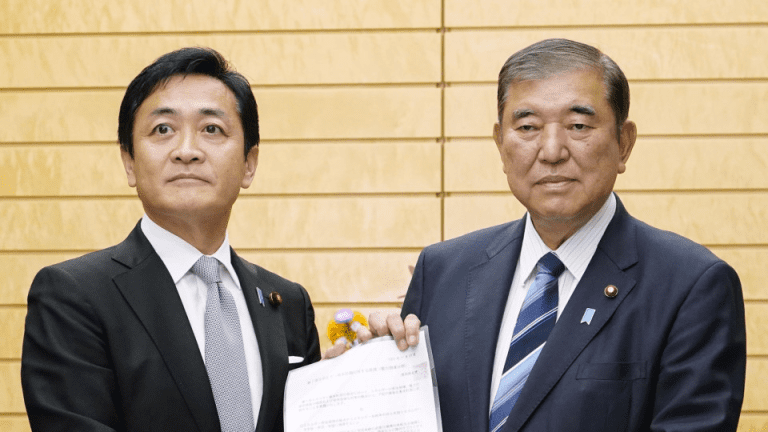The prospects of Prime Minister Shigeru Ishiba’s government will likely hinge on a small opposition party that in an electoral breakthrough won 28 seats in the 465-member House of Representatives.
The People’s Democratic Party quadrupled its seats in October’s general election by winning support from young voters through what some political analysts called populist pledges, such as measures to increase disposable income as inflation weighs on domestic demand.
As Ishiba’s Liberal Democratic Party and its junior coalition partner struggle to deliver on their promises after losing their majority in the lower house, the DPP has engaged in policy-by-policy negotiations with the ruling bloc, increasing thus its influence.

People’s Democratic Party leader Yuichiro Tamaki (L) hands Prime Minister Shigeru Ishiba a policy document at the prime minister’s office in Tokyo, November 27, 2024. (Kyodo)
The party’s popularity is increasingly expected to peak amid growing uncertainty over its ability to deliver on its priorities, as its leader, Yuichiro Tamaki, temporarily withdraws from public engagements until March following revelations of an affair shortly after the elections.
Rintaro Nishimura, a partner at business consultancy Asia Group Japan, said Tamaki and the DPP “haven’t really solidified” their new base, adding that their supporters “could change parties at any time.”
The DPP, successor to the now-defunct left-wing Japanese Democratic Party which governed the country for about three years until December 2012, shifted its focus from its base of union supporters to a campaign focused on social media.
The simplicity of the political headline, coupled with effective use of Tamaki’s YouTube channel, attracted younger voters – a demographic generally overlooked in an aging Japan, where older generations wield greater influence in national elections .
After a speech by Tamaki, a former Finance Ministry bureaucrat, during the election campaign, several new voters said they felt drawn to the party. Tatsuhiro Fukuda, a 19-year-old university student, said the DPP “is closest to my way of thinking.”
“I first heard him speaking online and thought he was someone I could trust,” he said, adding that Tamaki’s key policy of raising the threshold income tax of 1.03 million yen ($6,540) currently to increase take-home pay would help his parents. .
A Kyodo News survey showed that the DPP received support from people in their 20s, up 11 points to 15 percent, and from those in their 30s, up 9 points to 12 percent, compared with the 2021 general elections which allowed the LDP to control the lowest parties. House.
According to another poll in mid-December, support for the main opposition party, the Constitutional Democratic Party of Japan, stood at 11.3 percent, surpassed by the DPP at 12.6 percent.
LDP political chief Itsunori Onodera said the ruling coalition had responded to the DPP’s demands “as much as possible”, acknowledging that it would be almost impossible for Ishiba to advance his policies without the support of Tamaki’s party.
However, the DPP also faced difficulties in promoting its policies, including raising the income tax threshold, given that Ishiba, who served as Japan’s prime minister responsible for regional revitalization, pledged to support local economies in decline.
Official estimates show that fully implementing the DPP proposal would cost national and municipal governments a total of 7.6 trillion yen in lost revenue per year. Prefectural governors urged Ishiba to preserve local revenues.
Koji Nakakita, professor of politics at Tokyo’s Chuo University, said: “I have doubts about how long this popularity will last, and the trigger for that will be negotiations over income tax policy.” referring to the DPP.
Nakakita said the DPP was too ill-prepared to achieve its goals. The party based its ambitious proposal to raise the tax threshold on the increase in the minimum wage since 1995, while the LDP and its coalition partner, Komeito, argue for more modest adjustments.
“They had no reason to choose such a large increase. Although small parties made irresponsible promises to survive, this one unexpectedly garnered support,” he said, adding that the DPP is expected to suggest a lighter revision following the consumer price index.
Takahide Kiuchi, executive economist at the Nomura Research Institute, echoed this view, saying that the DPP “should not simply demand a big reduction in taxes, but rather take a broader perspective and remain flexible in its discussions with the ruling parties.
Facing signs of an impasse, the LDP decided to limit the DPP’s influence in advancing the legislation by inviting the 38-seat Japan Innovation Party to join discussions on expansion free education.
Tamaki is also suspending his role as leader for the time being after the party’s ethics committee ruled he had damaged his image, although his efforts have largely contributed to boosting support for the DPP since its creation in 2018.
“It is difficult to find anyone else in the party who can enjoy the same level of popularity,” Nakakita said.
Related coverage:
Japanese Prime Minister Ishiba considers a grand coalition with the opposition an ‘option’
FOCUS: Japan could see Trump and South Korean political chaos deteriorate three-way relations
FOCUS: Japan PM faces overhaul challenge as low support bodes ill for polls


